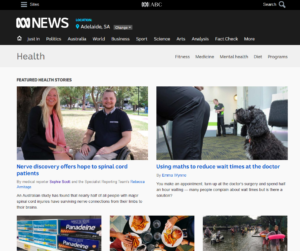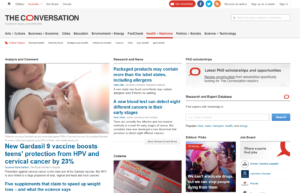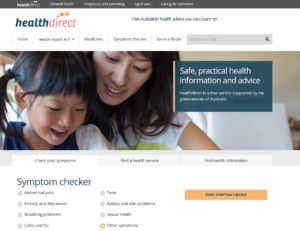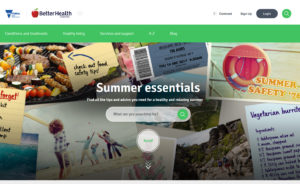
In this day and age, it is important to make conscious decisions about where you get your health news and information.
Why?
- Many of those providing health information are doing so for financial gain (e.g. sell a product or book). This means they might package that health information in a way that is more appealing, but not necessarily more accurate.
- Related to #1, individuals or organisations with large profits from the sales of health-related products/services can afford afford to advertise more broadly and more flashily, further influencing people’s health decisions, even if what they are promoting is not the best option.
- Some people providing health information are not actually qualified to do so. It can be hard to determine if a source of information is legitimate. For example, many health bloggers appear authoritative about health matters, but often have minimal qualifications.
- Most health websites aren’t under any requirements to provide evidence or support for their health claims.
- Some health professionals may take payments to promote certain products (e.g. drugs).
In this post, I am going to make some very specific suggestions about where you should get your health news and information, and explain why.
Health news vs health information
The question posed in the title of this blog post is actually two questions, as news and information, in the context of health, are quite different.
Health news is primarily the result of health journalism. Journalists, typically with some kind of relevant health qualification, write articles on the latest findings and developments from health research and practice. Like other news, health news is focused mostly on recent developments, latest findings, and current research. It is a summary of the most cutting edge work being done in different health areas.
Consumers of health news are people who are interested in what we know and are learning about the health of human beings. These consumers might be health professionals (like myself) who like to stay up-to-date on a wide range of health topics. Consumers might also be non health professionals who have a personal interest in learning more about health and wellbeing.
Whilst consumers of health news may use what they learn to improve their own health or the health of loved ones, often they consume the news simply because of an ongoing curiosity about health and well-being. In the same way that a keen follower of political news develops a good understanding of politics, keen followers of health news can develop a good understanding of a wide range of health issues.
Health information, on the other hand, is typically written by health professionals and is designed to provide consumers with specific information about the assessment, diagnosis and treatment of different health conditions and symptoms. Health information (when done well) constitutes a summary of the best available evidence on a particular health topic.
Consumers of health information typically seek it out because they, someone they care about, or someone they are treating, has a particular condition and they want to know how to best manage that condition.
This is an important distinction, because those seeking out health information are often more vulnerable than those seeking out health news. They, or someone they care about might be ill/unwell and they are looking to alleviate the suffering. This makes them more vulnerable to incorrect or fraudulent health information.
Both health news and health information are susceptible to bias. By that I mean that what is presented may not be totally accurate because:
- the person(s) writing the news or information don’t have a full understanding of the topic
- the person(s) writing the news or information might be motivated to present a certain view on the topic, to sell a product or service
- the person(s) writing the news or information might not be qualified to comment on the topic
- the person(s) writing the news or information might have a specific viewpoint that they are pushing
With this in mind, I’d thought I’d give you a sense of where to start your health news and health information journeys 🙂
Where to go for health news
In making these recommendations, I am assuming that you have a general interest in being healthy and are looking for somewhere to get regular health news on a variety of topics.
Starting Point – ABC Health News

It is hard to go past Australia’s public broadcaster for news. The activities of the ABC are not supported by advertising, so the influence of commercial interests is limited. Being government funded, the ABC is subject to a range of “internal policies, codes, and corporate social responsibility principles” that other sites are not. The ABC also has many experienced health journalists working for them who produce high quality content.
You can connect with ABC Health News in a number of ways – all of which are free. They have dedicated Facebook and Twitter pages or you can subscribe to receive the news via email. ABC News also has an advanced RSS system where you can create feeds based on a huge number of topics and sub-topics.
Also consider – The Conversation – Health and Medicine

The Conversation is produced by a not-for-profit media company ‘The Conversation Media Trust’. Their editors work directly with universities and research institutes to translate academic knowledge into a format consumable by the general public. Access to their content is free, editors and contributors must agree to clear guidelines on content, and the site is transparent about their funders and supporters.
Getting just the health and medicine news from the site is a little more difficult than with the ABC. The Conversation has Twitter and Facebook pages, but they include all content. If you sign up to the email newsletter, you can select Australian content but not specifically health/medicine content. If you use an RSS reader though, you can sign up to specifically receive health/medicine content.
Where to go for health information
In making these recommendations, I am assuming that you want to learn more about a particular health condition and are looking for a reliable source of health information that you can trust.
Starting point – Healthdirect

Healthdirect is a national government-owned not-for-profit organisation that has the goal of providing safe and practical health information. You can browse/search by condition, symptom, medicine and life stage as well as find health services. Healthdirect contract hundreds of information partners to provide the best quality and most up-to-date health and service information, in addition to having in-house writers. Content is subject to a number of quality criteria to ensure it is up-to-date and factually correct.
There are a number of ways to connect with Healthdirect. They have Facebook and Twitter pages, as well as a highly rated mobile app.
Also consider – BetterHealth Victoria

BetterHealth is very similar to Healthdirect, except that its health services information is Victoria specific (reflecting that it is funded by the Victorian Government). Their health information however is high quality and subject to similar rigorous standards. BetterHealth focuses both on health conditions but also on healthy living.
You can connect to BetterHealth via their Facebook, Twitter and YouTube pages.
Final thoughts
There is an abundance of health-related news and information on the internet. It can be used to help you live a happier and healthier life.
Selecting the right sources of information however can be a challenge. I hope the suggestions in this post give you a few good starting points for accessing high quality and accurate information.
In future posts, I’ll explore other health news/information sources and discuss the strengths and weaknesses of each.
Want to comment on this article, or ask me a question about the health and well-being services available to you as a student? Feel free to comment below, abuse me on Twitter (@Dr_Furber), contact me on Skype (search for ‘eMental Health Project Officer Gareth’), or email me (gareth.furber@flinders.edu.au)

